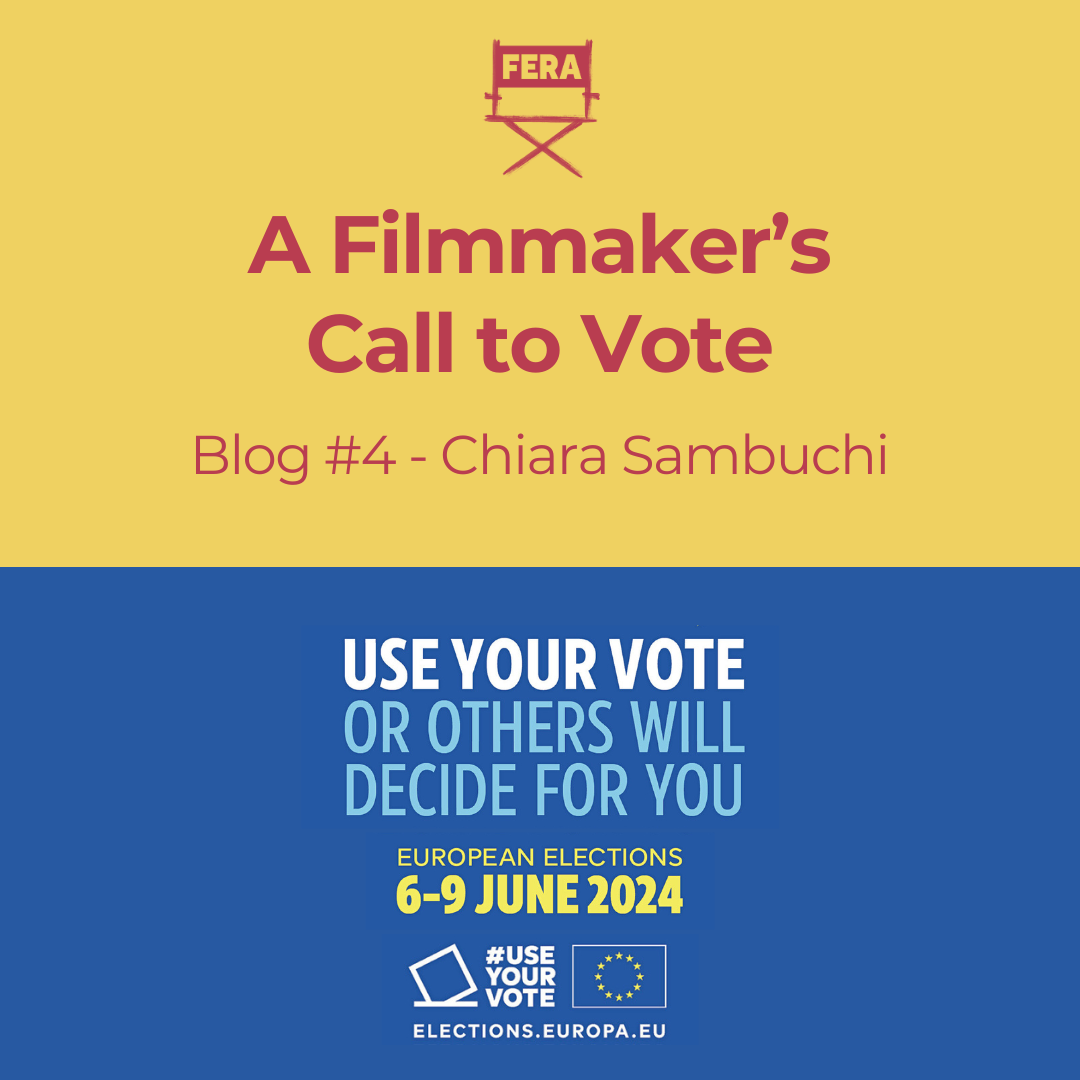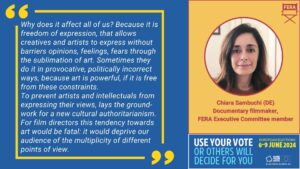
A Filmmaker’s Call to Vote in the EU Elections – blog #4

With only days to go until the European elections (6-9 June 2024, check the dates for your country here), the Federation of European Screen Directors (FERA) brings you a blog series penned by working filmmakers from our board.
The contributions aim to highlight the significance of voting in the European elections and their impact on our shared future. Through their unique perspectives and experience in storytelling, the filmmakers explore the vital role that these elections play in shaping policies, culture, and the artistic and creative landscape across Europe. With this series, we hope to inspire a deeper understanding of and active participation in the democratic process within our community and beyond. Join us on this journey. #Use your vote #Use your voice
Navigating art, free speech and criticism
By Chiara Sambuchi (DE), Documentary filmmaker and FERA Executive Committee member
A huge debate on anti-Semitism inflames the German cultural scene since months. Israel’s bombing of Gaza in response to the Hamas massacre of 7 October 2023, has been strongly criticised by many intellectuals and artists, who in Germany have been accused of anti-Semitism for doing so.
During the awards ceremony at the last Berlinale film festival, several actors and directors used their award acceptance speeches to express support for the Palestinian population, and to accuse Israel of carrying out genocide. Some German politicians harshly criticised directors for speaking out against Israel’s attacks in Gaza.
Meanwhile in Berlin a new anti-discrimination clause should make sure that no public funds support cultural projects considered “antisemitic”. It was withdrawn shortly after its introduction due to legal concerns, but it has caused a huge discussion around some questions: What kind of criticism of Israel’s policies is anti-semitic? Is there a risk of exploiting anti-Semitism to block the spread of uncomfortable ideas for a part of a country’s politics and society?
Why does it affect all of us?
Because it is freedom of expression, that allows creatives and artists to express without barriers opinions, feelings, fears through the sublimation of art. Sometimes they do it in provocative, politically incorrect ways, because art is powerful, if it is free from these constraints. To prevent artists and intellectuals from expressing their views, lays the groundwork for a new cultural authoritarianism. For film directors this tendency towards art would be fatal: it would deprive our audience of the multiplicity of different points of view. We must grant artistic freedom the right to be dissolute and scabrous, just as the right to criticise every artistic expression must remain intact.
The German case is by no means isolated in Europe. Freedom of expression is in danger globally, and surely also in other European countries. On 25 April, this year’s anniversary of Italy’s liberation from fascism, award-winning writer Antonio Scurati was supposed to perform during a show on public broadcaster RAI 3 a monologue he wrote, recalling some of the vicious crimes carried out during Italian fascist regime. In his monologue he was also to criticize the position of the current Italian government in office, which, in his opinion, never clearly distanced from his neo-fascist past. Within hours of airing, the public broadcaster RAI 3 announced the cancellation of the monologue, for unclear reasons. Meanwhile several journalists of the RAI group are on strike: They claim they’re no longer free to ask questions to the members of the current parliament, not to criticize its actions if they consider it is necessary.
Article 11 of the Charter of fundamental rights of the European Union is very clear about this: “Everyone has the right to freedom of expression. This right shall include freedom to hold opinions and to receive and impart information and ideas without interference by public authority and regardless of frontiers.”
Defend it by going to vote in the EU elections.

